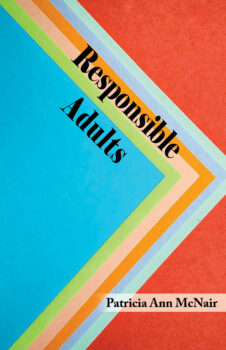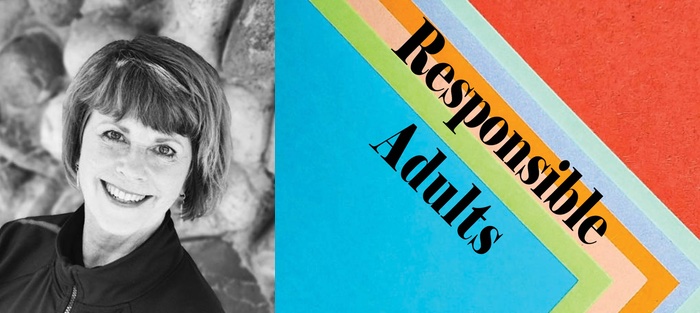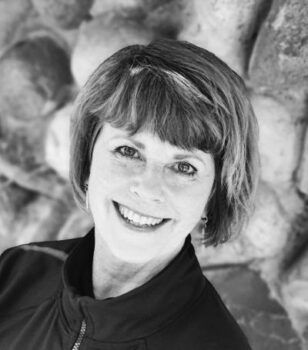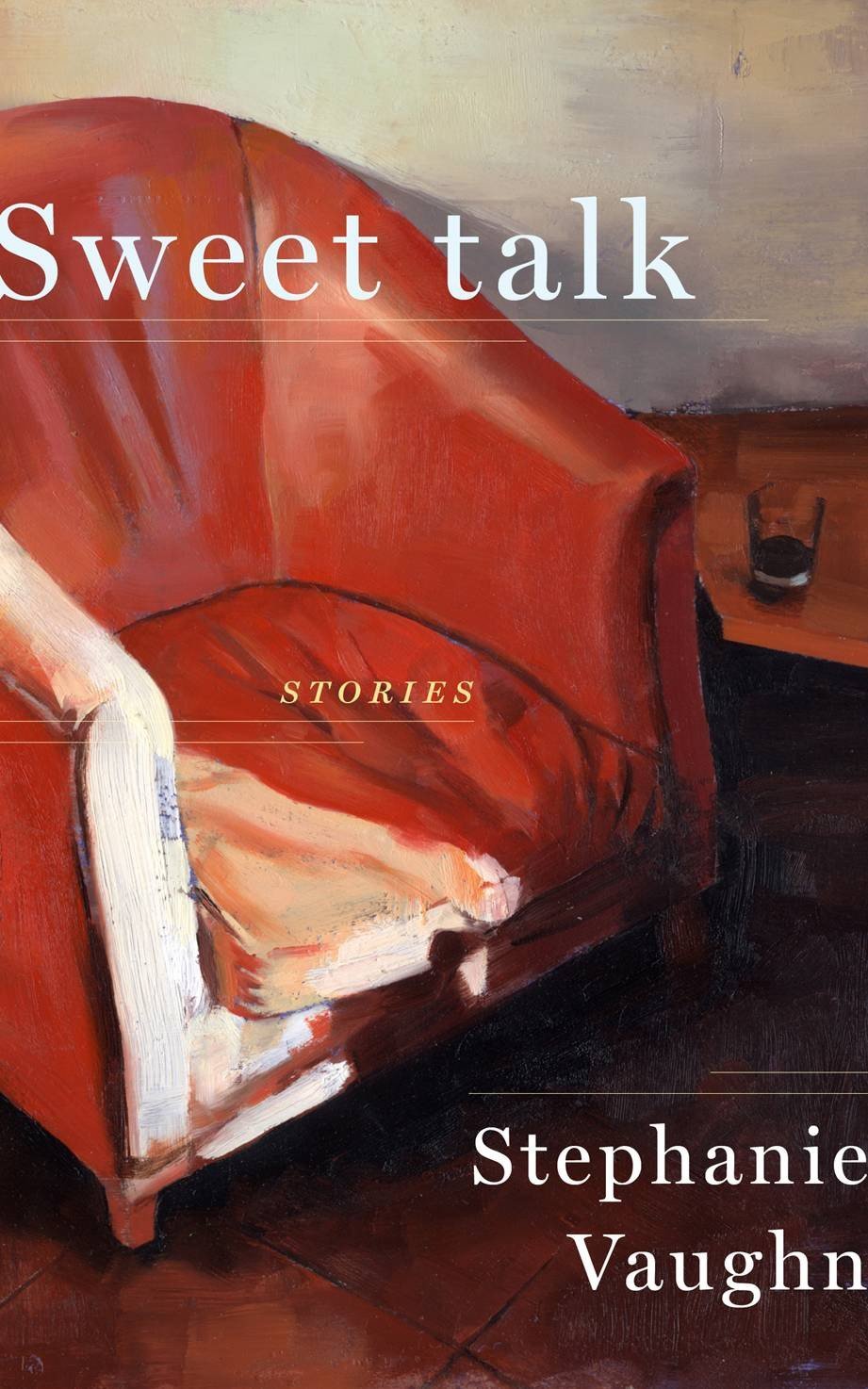I first met author Patricia Ann McNair more than ten years ago. She was serving as summer faculty at the Interlochen Center for the Arts, where she’d once been writer-in-residence, and I was the timid newbie who’d been hired as the new artistic director for the annual writers retreat. What a study I made of her, during that initial meeting: member of the prestigious faculty here and at Columbia College in Chicago, as well as an accomplished author with the uber-talented-equally-witty artist husband (Philip Hartigan). I remember wondering what it might feel like to live her city life, to teach the incredibly diverse and yearning students she told me about, to have—you know—stability.
But after a glass of wine and a good hour or two talking craft, each of us overlooking Green Lake and willing the June air of Michigan just a few degrees warmer, I didn’t have to study Patty. For she was already “Patty,” just a few hours in—not Patricia—and I could tell this was an artist, a woman, a human, who would never bullshit anything. If it’s possible to have three published books and have changed hundreds of writers’ lives, without having pride, then Patty is proof of exactly that.
Over the years, her authenticity has paved the way for what so many of us writers long for—true literary friendship. Yes, sure, the giving feedback and the swapping ideas and the shared book events. Yes, sure, the networking and the hosting. But really, above and beyond all that, our literary friendship has given me the sense of being held and respected in a circle of creative warmth and honest inquiry. And that, more than anything, is what I hope readers of Responsible Adults (Cornerstone Press, 2020) will feel as they read along: the sense of being welcomed into a world, of being held, and of looking up from the page when it’s all said and done with a bit more wisdom and compassion at the ready.
To that end, the interview that follows is not only a window into our literary friendship, but also a documentation of an ongoing conversation between two writers. With any luck, this conversation will carry us from book to book to book, city to city, lifetime to lifetime. For 2021, here’s where we’re at.
Interview:
Katey Schultz: As I read Responsible Adults, one of the most unforgettable takeaways was this idea that the harm we are capable of causing others can instead be used to shape the help we give others. What can you say about causing harm, choosing a path other than what fate wants for us? Or perhaps put another way, what is the relationship between harm, help, and redemption in your newest fiction?
Patricia Ann McNair: Those are both interesting questions, as is the idea of harm shaping help in some way. I am interested in harm, perhaps most obviously. Interested in the way we hurt one another, usually unintentionally, but not always so. Humans are so fallible, and frankly, that is what makes them interesting to me. In “My Mother’s Daughter,” for instance, the mother is consumed with finding romantic love, to the point of being unaware of how her daughter misinterprets that behavior and repeats it herself by looking for guys to make out with, guys to rub against. And yet, this mother and daughter love one another deeply, share space and food and stories and hopes. So there is harm there, yes, but the love between mother and daughter leaves room for redemption, maybe.
I have more than a few stories in which the adults make mistakes, but once they realize that, they overcorrect, shaping the help they can offer, as you say. “What Girls Want” is one of these. The stepfather, after having done some pretty bad things in his drunkenness, says to the reader—“And if it made any difference at all I’d tell you about the times when I tried to make it up to them, about stopping drinking, putting money away for Melanie’s college, the good things I did out of love or guilt, those two being so close together in my mind.” Is this a redemption? I’m not sure. Does it matter if it was out of love or guilt? Would one reason make the action more redemptive than the other?
I have been surprised that reviewers have mentioned more than once that my stories are compassionate. I try to see the characters in their wholeness, to understand (but not excuse) their crummy, damaging choices. Perhaps that is where I find redemption, in the compassion.
Several stories in Responsible Adults refer to the fictional town of New Hope, which is the central location for every story in your debut collection, Temple of Air. When I encountered New Hope in Responsible Adults, my first response was, “That’s bold,” because of course, your newest book is not a sequel. Its stories span locations and decades much farther reaching than the New Hope found in Temple of Air. Can you tell us about the decision to include New Hope in Responsible Adults? And from there, what can you say about “rules” for short story collections that you benefitted from breaking?
 Wouldn’t it be lovely if every reader of this new collection had read The Temple of Air and caught my recycling of the town’s name? To my mind, New Hope is pretty much the epitome of a Midwestern small town name. The building and naming of a town can be a naively hopeful thing. And the way it works in my stories, that hope is never quite enough. So, just like the title of the collection, Responsible Adults, I think of New Hope as an ironic name, or maybe a misguided misnomer.
Wouldn’t it be lovely if every reader of this new collection had read The Temple of Air and caught my recycling of the town’s name? To my mind, New Hope is pretty much the epitome of a Midwestern small town name. The building and naming of a town can be a naively hopeful thing. And the way it works in my stories, that hope is never quite enough. So, just like the title of the collection, Responsible Adults, I think of New Hope as an ironic name, or maybe a misguided misnomer.
I am certainly not the first writer who returns to their imaginary places in their stories: Jesmyn Ward and William Faulkner come to mind. I don’t think I’ve broken any rules by returning to New Hope or swinging close by it. I picture these stories in that place, or their characters as being from or aware of that place. And if I have done my job right with the first collection, then the town I created has more stories in it than the ones I’ve already told.
Back to this idea of rules, though. I am not aware of any set rules when it comes to story collections. How horrible it would be if there were such things! And if I knew of them, I would do my damnedest to break them. Or better yet, ignore them. Something less intentional than breaking. Shouldn’t each collection—each book, actually—determine its own rules? And shouldn’t those rules be discovered in the writing of the story rather than be imposed on it?
I completely agree; however, don’t you find that, as a writer, you can run into rules you’ve set for yourself that you didn’t even know you were working against until your writing and imagination break through to the other side? I’m thinking in terms of content and of craft. For instance, writing the other or writing in plural first-person point of view, just as examples.
Oh, absolutely. Structure sometimes is one of the rules I give myself. Sometimes I have an understanding of my characters, and even the situations I imagine them in, but it isn’t until I figure out that the story is going to be told through a series of answering machine messages, as in “Good News or Money,” that I can figure out the whole of the story. That said, I break my own structure rules all the time, or rather, the wisdom of the story breaks through like you say. I heard someone once talk about how certain ideas or story habits or ways of telling or story challenges we bring to the page can be like the friend who brings you to the party. Once they get you there, you don’t need to hang out with them, you can get home on your own. I love it when that happens in the writing.
Responsible Adults breaks other rules, too. I’m thinking about how many “bad moms” there are in this book. Culturally speaking, many folks cringe at the idea of a fallible mother, to the point that fallible fathers, in a sort of ricochet avoidance response, have become literary clichés, in my opinion. It’s not that literature has skipped over bad mothers to any extent, but I think there’s something to this idea of forcing a reader to see the impact of physically and psychologically absent mothers. If bad moms are “easy” for you to write, can you tell us why? And if they’re difficult, how did you coach yourself toward believable, cringe-worthy moments where these impacts become apparent?
Mother-daughter relationships are fraught. Really, all parent/child relationships are, and most parents (I can say this because I am not one) screw up in some way. And the effect of that is interesting to me. I don’t know that the idea of a bad dad is a cliché—it is an actuality. My own father abandoned his first family to marry my mom. He “abandoned” us when he died unexpectedly at 55. Maybe it isn’t the story propeller of the bad dad that is cliché, but the way some writers handle the aftermath. Doesn’t there have to be something more than just: here is my trauma, wasn’t he horrible, I am a survivor?
I am more interested in how folks respond to these bad acts done to them than the act itself. Even in the telling of the act, it is the attention to the details and surprises of it that intrigue me. In “Good News or Money,” for instance, the daughter recalls a moment when her father came home without his shoes, and the mother believes his story that he gave them to someone who needed them, only to find out later that he left them at another woman’s place. In the specific, unique details and the fallout from them is where you find the heartbeat of the story.
But you asked specifically about bad moms. Here’s a small and jaded story. I remember once talking to my students about the upcoming Thanksgiving weekend and the pain we would all have to endure by being with our families, our folks. These sweet nineteen-year-old kids looked aghast at the idea that being with their families would be a chore, a pain. And I realized that they were still at that stage—their parents were amazing.
To me, there are five stages of the knowledge of an off-spring. One, your parents are everything (little kid phase); two, your parents are lame and intrusive (teenaged phase); three, your parents were right all along (new adult phase); four, your parents made a lot of mistakes, and it hurts to be reminded of that (into middle age, at least); five, your parents are/were people, good and bad, shiny and tarnished.
Now, Katey, I know you have fabulous parents and are a fabulous parent yourself, so these stages might not apply to you. All of this is to say that I am interested in the way we are good and bad to one another, particularly those we are closest to. I suppose I gravitated to bad moms in these stories because many of them were written not too-too long after my own mother (whom I loved immensely, but who also took up with a married man and colluded with him when he left his first family) died, and I was very much aware of the complications of mother/daughter interactions.
As a follow-up question, what can you tell readers about writing what we “shouldn’t,” in general—and why, more than likely, we probably should? Are there examples from your early work when you felt yourself experimenting with these shoulds and shouldn’ts and what have those taught you now, three books into your career?
Ahh, the self-censor. I was lucky to have been introduced to writing at Columbia College Chicago where I now teach, trained in the Story Workshop approach to the teaching of writing. John Schultz, sadly gone now, was the originator of this methodology, and there is too much to it to explain it all here. However, one thing that is essential to the work we undertake in these workshops is a sense of permission. Just tell it. This was so wonderful to me, being allowed to tell the stories that I wanted to tell in the way I wanted to tell them. And I sort of came of age as a writer during a time when a kind of gritty realism was popular—Raymond Carver and all of that. It shocked my mother, the way I wrote about sex and used raw language, the way I wanted to capture moments of brutal beauty. There were (are?) no happy endings in the things I write, no guiding lights.
I used to believe that everything was fair game in a story or essay, no matter whose wounds you might be exposing, no matter who you might sting with your words. Now, though, I don’t entirely believe that. Maybe because I am in my sixties, and I find myself yearning toward kindness most days (his is undoubtedly a reaction to the evil that was in charge of things for the last four years, to the daily rage I felt), I constantly remind myself that what I should be doing is trying to write the best story or essay I can. What I should not be doing is knowingly hurting someone with it.
This does not mean that things should not be told, should not be exposed, but we writers should examine our motivations more closely than we might want to. Because I do think that bringing things into the light is important to what we do. Nowadays when I ask my students what they want to write about, they often say “my trauma.” And then they do. Literally. “My trauma,” they write, or “the thing that happened to me, I don’t need to legitimize it by getting into the details.” Nothing specific; they too often hide behind labeling, therapeutic language. Okay, fine, I have to say, write about it. But pull the bandage off so we can get a real look at that trauma. If you don’t let yourself look at it, study it, you can’t really learn from it. You can’t really write about it.
Maybe it comes down to something exceedingly simplistic: you should write what you feel compelled to write. You should be driven by the story. You shouldn’t be driven by the desire to shock or hurt. You should strive to recognize the difference and be able to articulate why you’ve made your choices. You should write everything. But maybe you shouldn’t leave everything in.
I mentor a lot of writers interested in covering the decades that most stories in Responsible Adults cover—the late 1970s to the early 2000s. Their chief fear is that there isn’t a readership for these decades; either it’s “already been said” or “isn’t marketable” or “seems antiquated.” How might you address these concerns and, additionally, what was it about this time frame, in particular, that helped you say what needed to be said?
I, like many of the writers you work with, am a baby boomer. Tail end of that time. So my experiences as a kid, a youngish adult, took place in the late ’sixties and ’seventies, primarily. When I think of this book, although it does span decades, I think of it in a ’seventies way. The lovely book cover design captures that late mid-century feel, the geometrics of the style then. The years in which I’ve set Responsible Adults are relatively low-tech as well, and that works with what I am trying to do. Most of the characters don’t have the world in their pocket like we all do now. A message left on an answering machine is different from a voicemail. (Remember when we hoped someone would be listening to our message? That we might say something that would make them pick up?) Kids were allowed to be more on their own back then; they were less monitored than many of them are now. All of these things are part of my understanding of the world, and hence part of the world I recreate on the page.
As you read through these stories, the decades in which they are set move forward, but the characters, the main ones, and narrators, age, too. As I have. I don’t have the research and imagination chops that you have, Katey, to be able to tell something I am not familiar with as you did so well in your first two books. I can’t easily (or maybe I don’t want to?) write a story from the point of view of a millennial or a teenager in 2021. It would not come off with any sort of authenticity or authority.
That is one thing I might say to your students: look for the authenticity of what you have to tell. What do you know well—either through experience or serious research borne from deep curiosity? Then, consider how to make it fresh. What surprises you in what you are seeing in your mind, something not obvious or cliché or overused?
As for “Isn’t marketable,” don’t even get me started on that. Writing to the market? Especially as an emerging writer? Wrong thing to be worried about. But also wrong is the idea that period, retro, or vintage pieces aren’t marketable. Ever hear of Mad Men? Lauren Groff’s Arcadia? The Ice Storm, The Nickel Boys, Where the Crawdads Sing? The list of new and marketable work from generations past is long.
Excellent insights and advice, indeed.
I have one final question. I wanted to ask you about the tropes of mystery writing, hidden inside what we might call, for lack of a better way of putting it, realist literary fiction. I happen to believe that all writing is mystery, but how each story or essay reveals or holds back information and ultimately converges toward a conclusive end, varies endlessly. One thing I admire about Responsible Adults is the degree to which I felt you naturally, and quite successfully, lean on “the slow reveal” as a tension-builder and plot-mover. To what degree are you consciously working with craft techniques associated with “mystery”? And to what degree do you let mystery be…mysterious, alchemical? And what does this push-pull teach you, if, in fact, you experience it that way?
Your idea that all writing is mystery is very intriguing. I’m going to have to think about that for a while. It is probably true—we plant clues, leave hints; the story does that for us, too. It lures us in to the writing with a promise of something worth hunting for. It’s very likely that all of my writing is a mystery to me when I start a story. I don’t quite know what will happen, or sometimes more importantly, what already happened to get us to the point I am writing about. So that slow revelation is rarely intentional; I am on the story’s schedule here. It will let me know what I need to when I need to.
You remember that quote—Doctorow, I believe (yes, I Googled it)—about writing being like driving in the fog? “You can only see as far as your headlights, but you can make the whole trip that way.” I come to story like that. I can see that signpost up ahead, and I aim for that. Once I get there, I can see the bend in the road beyond it. Further ahead there are lights that might be a motel—wait, wait—no! A gas station! I live for that process of discovery.
This is very fertile, drafty stuff, I’m talking about now. The rush of words on the page. Tell this and this and this and this and this. Later, after I’ve followed those bends and drove towards the next sign and started to get a sense of where I really am headed, I might discover that I missed a turn along the way. So I write my way back to that. In “What Girls Want” I certainly felt that push and pull of intentional craft choices (direct address to the reader, a slightly broken frame of a present moment to hold what happened years before) and alchemic discovery (the narrator’s full confession to the reader of his very bad act). I drove right by that confession at first, then doubled back in the writing. And in the final stages of revision, I sorted all of that out into a structure that made sense to me and for the story.
And that makes me think some more about revision, about rewriting. I revise a lot. Big things, tiny things. Was he a drunk all along? Did the father die or just run off? Should this be an “and” or a “but”? Is it “her mother” or “the mother”? You know. And I kind of hate it, revising. Unless I can find that mystery you talk about while I am doing it. What can I discover in this draft that I hadn’t recognized in the first one, the second, the sixth? What don’t I know yet, and how much should I expose? And when?
I think I might make a little sign for my computer that says, “What’s the mystery?” now that you have me thinking about this. I will keep that question in my periphery. What is the mystery? Because if there isn’t any, why bother?







